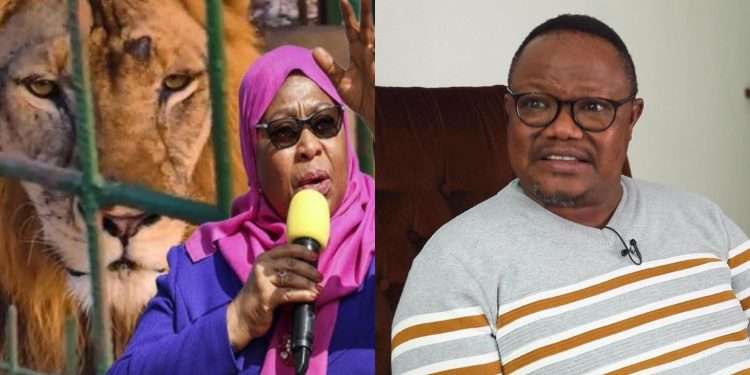Tanzanian President Samia Suluhu Hassan has jokingly suggested naming a hungry lion after one of the country’s most prominent opposition figures, Tundu Lissu. The comment which is now animating public debates in the country was made as the president toured a booth run by the National Wildlife Agency and encountered a restless lion pacing in a small cage.
In widely shared videos, a keeper explained that the lion had not yet eaten, prompting President Hassan to inquire about its name. Upon hearing it had none, she quipped, “Name it after my son Tundu Lissu,” eliciting laughter from onlookers. The lighthearted reference played on her affectionate nickname, “Mama Samia,” and the well-known opposition politician.
On Sunday, President Hassan further elaborated on the joke, likening the “spirited and somewhat mischievous lion” to the “unsettled” Lissu, who narrowly survived an assassination attempt in 2017 and ran for the presidency in 2020.
“So, I suggested naming it Tundu Lissu because it was as restless as my son Tundu Lissu,” she added, underscoring the good-natured banter.
Lissu, known for his fierce criticism of the ruling Chama Cha Mapinduzi (CCM) party, responded graciously to the joke. “President Hassan was correct as I was born into a family of heroes… people who killed lions that attacked cattle,” he told local media. Lissu further recounted that in his family’s Turu tribe, such individuals were called “ahomi” or “muhomi.” Both his grandfather and father had earned that title by defending their livestock from lions.
The exchange comes in the wake of increased tension between the government and the opposition. Just weeks prior, police arrested top opposition leaders in the southern city of Mbeya during youth day celebrations, sparking concern among rights groups that the country could revert to the oppressive tactics seen under the late President John Magufuli.
Since taking office in 2021 after Magufuli’s death, President Hassan has rolled back some of the restrictions imposed on the media and political opposition. However, the recent arrests have raised questions about the future of political freedoms in Tanzania as the country heads toward elections late next year.



